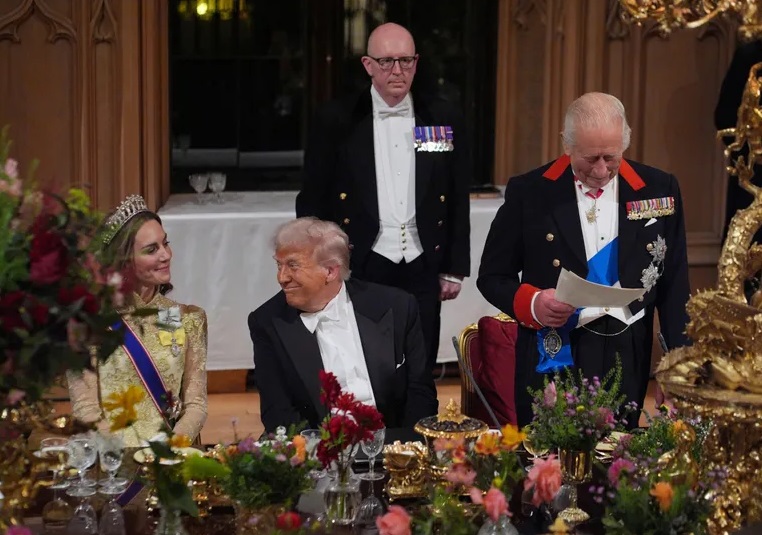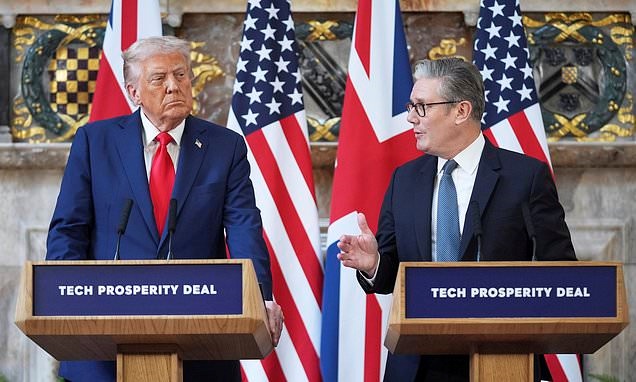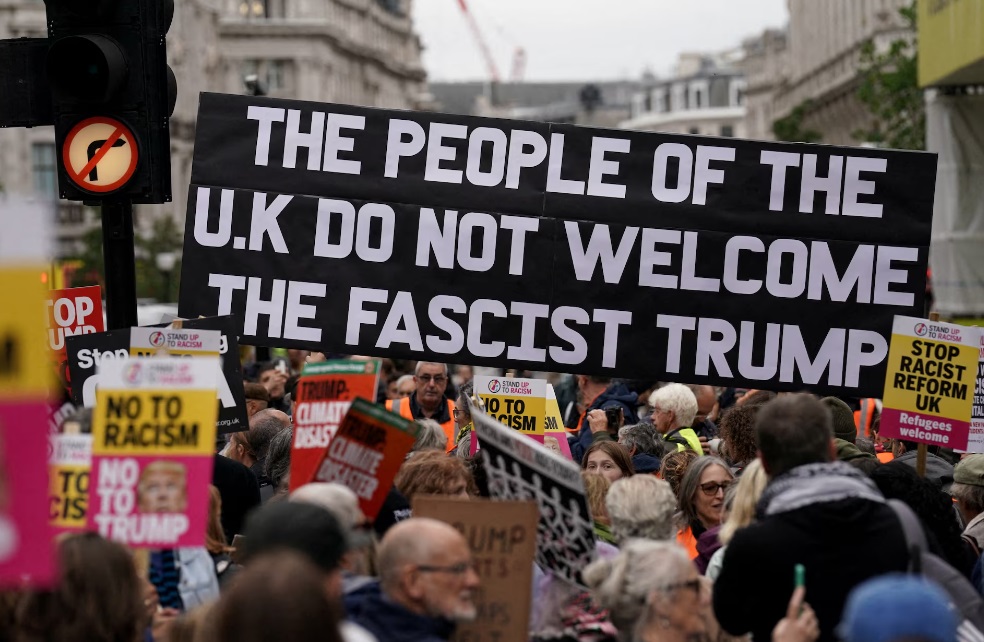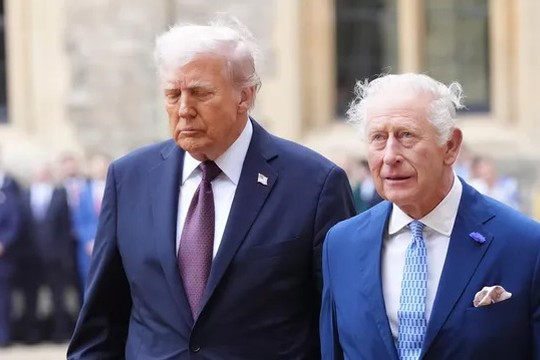President Donald Trump and King Charles III walk during the ceremonial welcome at Windsor Castle. Berkshire, Wednesday, September 17.
Photo: Reuters
President Donald Trump traded pageantry for politics Thursday as he ended a lavish stay hosted by Britain's King Charles III at Windsor Castle and met with Prime Minister Keir Starmer at his country residence, Chequers, NBC reports.
Hailing the “unbreakable bond” between the two nations, Trump said ties between America and the U.K. were “priceless” and the two governments were “making those ties closer than ever before.”
Starmer has lavished Trump with praise and royal pomp in a bid to curry favor with Washington as Britain looks to deepen its economic ties with the U.S., ease tariffs and hold difficult conversations on a range of thorny issues — including Israel’s offensive in Gaza and Russia’s war in Ukraine.
The pair held a joint news conference in one of Chequers' grandest rooms on Thursday ahead of Trump's return home, where they continued to emphasize their countries' long and close ties. The two leaders also avoided commenting on each other's domestic policies, which is customary, when asked about hot-button issues such as immigration, free speech and the recognition of the state of Palestine.
Asked when he would tell Israeli Prime Minister Benjamin Netanyahu to end the war in Gaza, Trump said he wanted hostages to be freed.
“I don’t want the hostages used as human shields, which is what Hamas is threatening to do,” Trump said.
Trump acknowledged that the U.K.’s expected recognition of a Palestinian state was one of the “few disagreements” he has with Starmer.
For his part, Starmer said the situation in Gaza is "intolerable," adding that the hostages have been held for a long time and "must be freed."
"We need aid to get into Gaza at speed. And so it’s within that context of a plan for peace, which we’re working hard on... that the question of recognition needs to be seen," he said. "It’s part of that overall package which hopefully takes us from the appalling situation we’re in now, to the outcome of a safe and secure Israel, which we do not have."
Both agreed that more pressure to end the war in Ukraine needed to be placed on Russian President Vladimir Putin, although neither committed to new sanctions.
"There are a number of European countries which are too reliant on energy from Russia," he said.
Earlier, Starmer was all smiles as he and his wife Victoria greeted Trump at Chequers, a 16th century manor house that is the prime minister's official country residence, some 40 miles north of London.
There, they met with American and British business leaders, including the chief executives of Nvidia, Microsoft, Rolls-Royce and Boeing, before signing a multibillion-dollar tech prosperity agreement that British officials hope will bring thousands of jobs and sweeping investment to the U.K.
Each leader is dealing with a febrile atmosphere at home. Trump arrived in Britain in the wake of Charlie Kirk's fatal shooting, while his host has been beset by far-right protests, sinking poll ratings and a recent scandal that led to a question about Jeffrey Epstein during Thursday's press conference.
And on the streets of London, thousands attended a protest march that culminated with a rally outside Parliament.
In recent polling highlighting British sentiments toward the president, 70% of Britons said they disliked Trump and 44% said they thought his state visit should be canceled.
 King Charles III delivers his speech as President Donald Trump and the Princess of Wales listen during the state banquet at Windsor Castle.
King Charles III delivers his speech as President Donald Trump and the Princess of Wales listen during the state banquet at Windsor Castle.
Photo: Reuters
What Trump and the tech CEOs want from the UK
As corporate titans tout fresh U.K. investments and join Trump on his state visit, lobbyists hope they'll pressure an American ally to back down on its strict tech rules.
President Donald Trump and a pack of top tech-company CEOs are at Windsor Castle to unveil a juicy, $42 billion tech development deal in the United Kingdom — a move some tech lobbyists hope will entice the U.K. to roll back tough digital rules against U.S. companies, POLITICO stresses.
The investment package is modest by the standards of an industry that regularly unveils plans costing hundreds of billions of dollars. But the delegation traveling with Trump is an unmistakable expression of American business clout: Microsoft CEO Satya Nadella, OpenAI CEO Sam Altman, Nvidia CEO Jensen Huang and other leaders from some of the world’s wealthiest companies.
The deal includes new U.K. spending by Nvidia and Microsoft, and promises of an “AI growth zone” in economically troubled northeast England. Behind all the talk of transatlantic partnership, however, there’s speculation that the White House and its tech sector allies intend to send a message to overseas leaders.
One U.S. tech industry representative, familiar with policy discussions and granted anonymity to discuss sensitive talks, suggested that the Trump administration may be taking a carrot-and-stick approach as it negotiates with the U.K. over trade, tariffs and taxes — and that this trip, and the new tech investment, represent the carrots.
Jonathan McHale, head of digital trade at the Computer and Communications Industry Association, one of the top U.S. tech lobbies, hopes the deal will serve as a friendly nudge to the U.K. government following Trump administration threats to levy tariffs against the U.K. over its “discriminatory” digital taxes.
This week’s investments in new U.K.-based data centers coincide with the announcement of a U.K.-U.S. “Tech Prosperity Deal,” which would see the two governments collaborate on AI and quantum initiatives. Microsoft is the largest investor, followed by OpenAI and Nvidia.
In the U.K., AI Minister Kanishka Narayan told reporters his government made no promises about tech regulations in order to secure this week’s deal.
Spokespeople for the White House and OpenAI did not respond to a request for comment. Spokespeople for Microsoft and Nvidia declined to comment.

For all their declarations of mutual admiration and close alignment, President Donald Trump and British Prime Minister Keir Starmer were unable to maintain a united front on the war between Russia and Ukraine, POLITICO notes.
The two leaders both insisted they want a ceasefire but were at odds over the best way to pressure Russian President Vladimir Putin, who has in recent weeks amped up attacks on Ukraine and sent drones into NATO airspace.
Trump, during a joint press conference outside London on Thursday, told reporters that he remains disappointed in Putin but evaded multiple questions about what he planned to do next.
“He’s really let me down,” Trump said of Putin, before pivoting to the “seven wars” he’s worked to end.
Starmer, who said Trump has “led the way” in trying to end the war in Ukraine, was far firmer about the need for increasing economic pressure on Moscow.
…They don’t like Trump in Britain.
 Photo: Reuters
Photo: Reuters
read more in our Telegram-channel https://t.me/The_International_Affairs

 11:06 19.09.2025 •
11:06 19.09.2025 •























